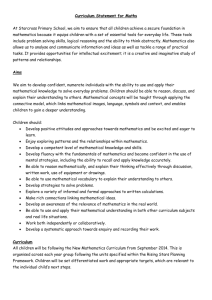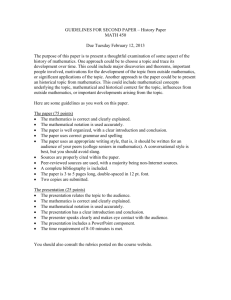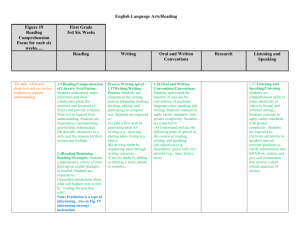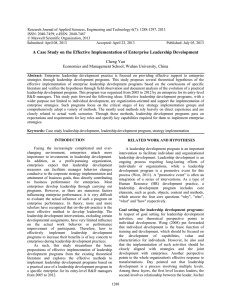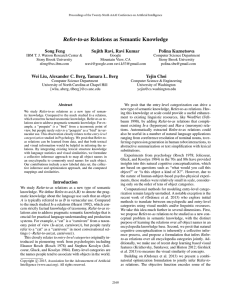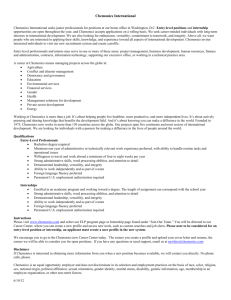Core Subjects- College Readiness
advertisement
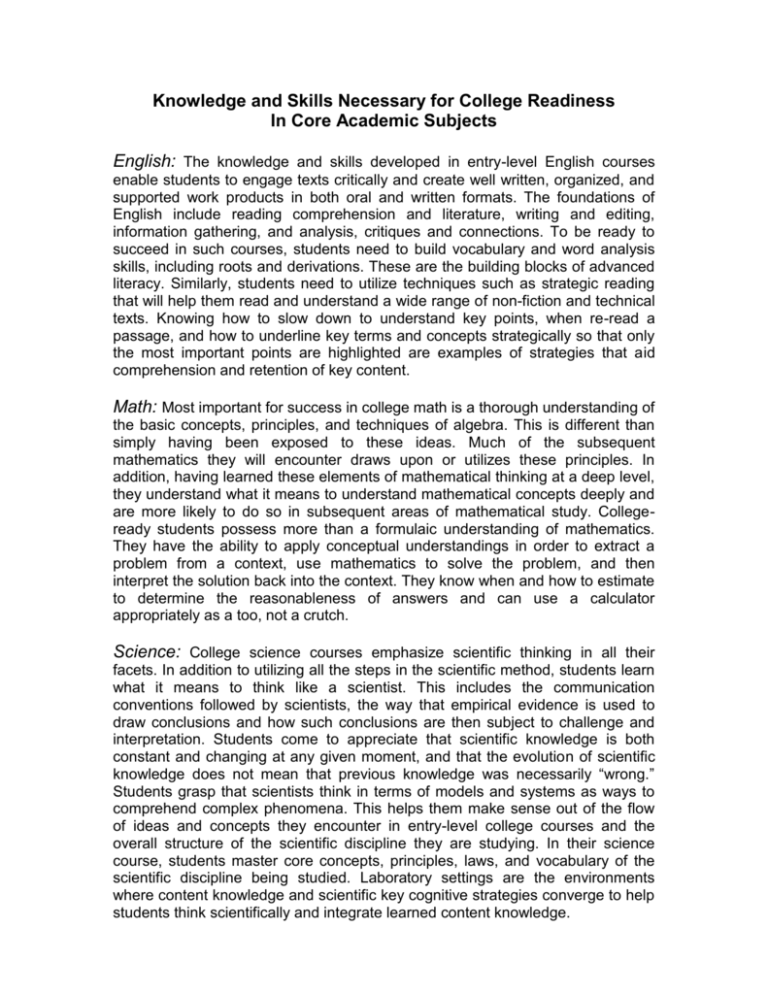
Knowledge and Skills Necessary for College Readiness In Core Academic Subjects English: The knowledge and skills developed in entry-level English courses enable students to engage texts critically and create well written, organized, and supported work products in both oral and written formats. The foundations of English include reading comprehension and literature, writing and editing, information gathering, and analysis, critiques and connections. To be ready to succeed in such courses, students need to build vocabulary and word analysis skills, including roots and derivations. These are the building blocks of advanced literacy. Similarly, students need to utilize techniques such as strategic reading that will help them read and understand a wide range of non-fiction and technical texts. Knowing how to slow down to understand key points, when re-read a passage, and how to underline key terms and concepts strategically so that only the most important points are highlighted are examples of strategies that aid comprehension and retention of key content. Math: Most important for success in college math is a thorough understanding of the basic concepts, principles, and techniques of algebra. This is different than simply having been exposed to these ideas. Much of the subsequent mathematics they will encounter draws upon or utilizes these principles. In addition, having learned these elements of mathematical thinking at a deep level, they understand what it means to understand mathematical concepts deeply and are more likely to do so in subsequent areas of mathematical study. Collegeready students possess more than a formulaic understanding of mathematics. They have the ability to apply conceptual understandings in order to extract a problem from a context, use mathematics to solve the problem, and then interpret the solution back into the context. They know when and how to estimate to determine the reasonableness of answers and can use a calculator appropriately as a too, not a crutch. Science: College science courses emphasize scientific thinking in all their facets. In addition to utilizing all the steps in the scientific method, students learn what it means to think like a scientist. This includes the communication conventions followed by scientists, the way that empirical evidence is used to draw conclusions and how such conclusions are then subject to challenge and interpretation. Students come to appreciate that scientific knowledge is both constant and changing at any given moment, and that the evolution of scientific knowledge does not mean that previous knowledge was necessarily “wrong.” Students grasp that scientists think in terms of models and systems as ways to comprehend complex phenomena. This helps them make sense out of the flow of ideas and concepts they encounter in entry-level college courses and the overall structure of the scientific discipline they are studying. In their science course, students master core concepts, principles, laws, and vocabulary of the scientific discipline being studied. Laboratory settings are the environments where content knowledge and scientific key cognitive strategies converge to help students think scientifically and integrate learned content knowledge. Social Studies: The social sciences entail a range of subject areas, each with its own content base and analytic techniques and conventions. The courses an entry-level college student most typically takes are in geography, political science, economics, psychology, sociology, history, and the humanities. The scientific methods that are common across the social studies emphasize the skills of interpreting sources, evaluating evidence and competing claims, and understanding themes and the overall flow of events within larger frameworks or organizing structures. Helping students to be aware that the social sciences consist of certain “big ideas” (theories and concepts) that are used to order and structure all of the detail that often overwhelms them can help build mental scaffolds that lead toward thinking like a social scientist. World Languages: The goal of second language study is to communicate effectively with and receive communication form speakers of another language in authentic cultural context through the skills of listening, speaking, reading, and writing. Learning another language involves much more than memorizing a system of grammatical rules. It requires the learner to understand the cultures from which the language arises and in which it resides, use the language to communicate accurately, and use the learner’s first language and culture as a model for comparison with the language and culture being learned. Second language proficiency can improve learning in other disciplines, such as English, history and art, and expand professional, personal, and social opportunities. Language learners need to understand the structure and conventions of a language, but not through word-for-word translation or memorization of decontextualized grammatical rules. Instead, students of a language need to master meaning in more holistic ways and in context. The Arts: The arts refer to college subject areas including art history, dance, music, theater, and visual arts. Students ready for college-level work in the arts possess an understanding of and appreciation for the contributions made by the most innovative creators in the field. Students come to understand themselves as instruments of communication and expression who demonstrate mastery of basic oral and physical expression through sound, movement, and visual representations. They understand the role of the arts as an instrument of social and political expression. They formulate and present difficult questions through their personal artistic visions. They are able to justify their aesthetic decisions when creating or performing a piece of work and know how to make decisions regarding the proper venue for performing or exhibiting any creative product. Source: Conley, David T. Toward a More Comprehensive Conception of College Readiness. Eugene, OR: Educational Policy Improvement Center, 2007.






